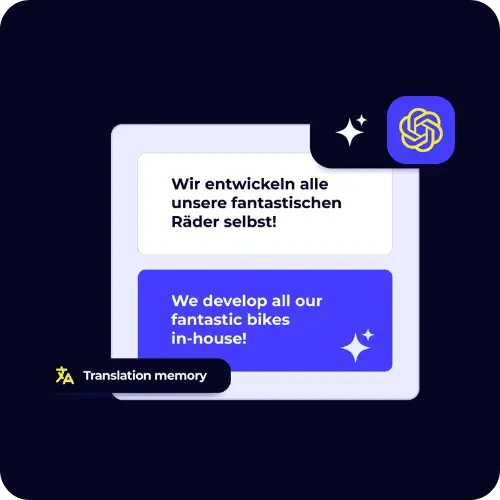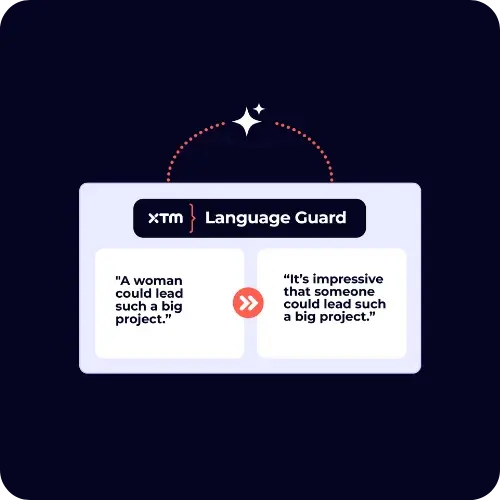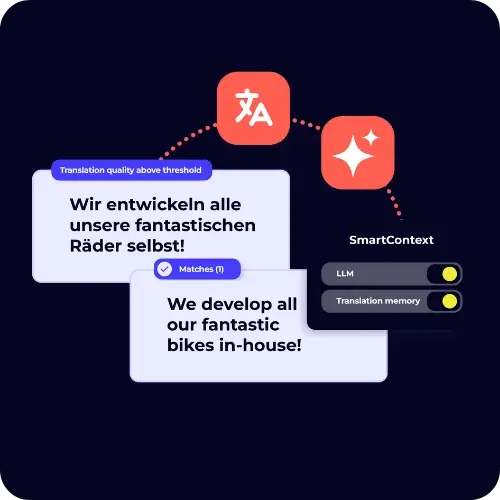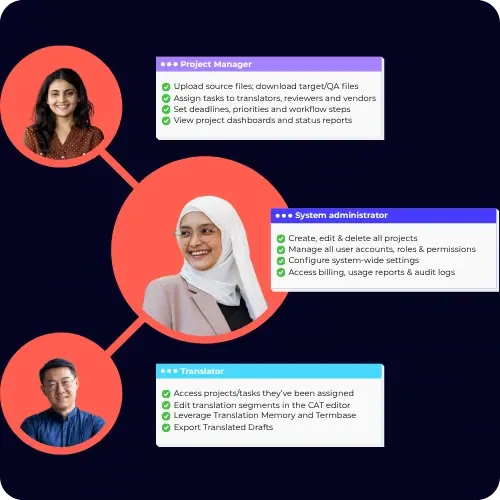Unlock Japanese market success with professional English to Japanese translations
Translating your content into Japanese gives you access to one of the world’s most demanding and high-value markets.
XTM’s AI-powered platform delivers fast, accurate English to Japanese translation — with full control over consistency, quality, and cost.
Whether you're entering Japan’s tech, retail, or finance sectors, XTM gives your team the tools to scale efficiently and localize with confidence.
Book your 30-minute demo

Book your 30-minute demo

Trusted by teams at over 1,000 of the world’s leading organizations
Why your business needs Japanese translation services
Japan is the third-largest economy in the world, with a GDP of over $4.2 trillion — and it offers massive potential for international businesses. Japanese consumers are known for their strong brand loyalty and are often willing to pay more for high-quality products.
But here’s the key: 87% of Japanese buyers prefer to shop in their native language. Even though many professionals speak English, most consumers expect product information, customer support, and marketing content to be in Japanese. If it’s not, you’re likely to lose their trust — and their business.
Japanese culture places a high value on precision, clarity and respect. A poor translation isn’t just an inconvenience — it’s a serious dent to your reputation. To make a strong impression in this market, your content needs to be linguistically accurate and culturally sensitive.
It’s also worth noting that large Japanese-speaking communities live outside of Japan — in countries like Brazil, Peru and the United States. Localising your content into Japanese can help you reach these audiences too.
Real results in English to Japanese translation. Not just promises.
Businesses using XTM for English to Japanese translation see faster turnaround times, fewer errors, and more consistent results.
Reduction in translation errors
Cost saving with machine translation
faster time-to-market
Why translating from English to Japanese is especially challenging
Context matters more than you might expect
In Japanese, how you say something depends heavily on who you're speaking to, their role, and the situation. That means the same sentence in English could have multiple valid translations in Japanese — and using the wrong one can come across as rude or inappropriate.
There’s also keigo, the system of honorific language. It’s essential for business, customer service, and formal communication — but it doesn’t have a direct equivalent in English. If you want to sound respectful and professional, you’ll need translators who understand when and how to use it properly.
Precision is vital in technical fields
If you’re in industries like manufacturing, healthcare or tech, your Japanese translations need to be spot on. Many sectors require specific terms that comply with local regulations — especially in areas like medical devices or pharmaceuticals.
Legal content adds another layer of complexity. Japanese law often uses different frameworks and concepts than English-speaking countries. If you’re translating contracts or compliance documentation, you’ll need someone with expertise in both systems.
Design and formatting need extra attention
Japanese text doesn’t always match the length of the original English — sometimes it’s shorter, sometimes longer. It can also be written horizontally or vertically, which affects how your content fits into a layout.
Technical issues come into play too. Some fonts don’t support all Japanese characters, and poor font choices can lead to unreadable or unprofessional-looking content. You’ll also need to think about encoding standards to avoid display errors.
Three writing systems — used at the same time
Japanese uses hiragana, katakana and kanji — often all within the same sentence. Each system has its own purpose. Getting these wrong is a red flag for Japanese readers. Even small mistakes can confuse the meaning or make your content look sloppy and unprofessional.
Hiragana
Hiragana is a core part of written Japanese. It's used for native words, grammatical markers, and word endings where kanji isn't needed.
Katakana
Katakana is used to write foreign words, names, and loanwords. It also adds emphasis or represents technical and scientific terms.
Kanji
Kanji are characters borrowed from Chinese that carry meaning. They're used for nouns, verb stems, and other core parts of the language.
XTM: AI-powered English to Japanese translation, done right
XTM helps global companies manage complex translation projects — including Japanese — with speed, accuracy and cultural finesse.
We go beyond basic translation. Our platform blends powerful AI tools with expert human translators to produce content that’s not only correct, but natural-sounding, respectful and in line with Japanese expectations.
Whether you’re localising a website, updating technical documents or launching a new product, XTM helps you maintain your brand voice, stay compliant with local regulations, and connect with Japanese audiences in a way that feels personal and professional.
By connecting translators, reviewers and project managers in one seamless system, XTM cuts down delays, reduces rework and eliminates the miscommunications that often slow down traditional translation processes.
Advanced features for English to Japanese translation
Translation memory technology
Reduce costs and speed up delivery by reusing previously approved English to Japanese translations. XTM automatically captures every translated segment and stores it in secure translation memory databases. When similar content appears in future projects, the system instantly suggests these matches to linguists.
This technology proves especially valuable for companies with repetitive content like product catalogues, user manuals, or legal documents. Instead of paying to translate the same phrases repeatedly, you invest once and benefit from automatic reuse across all future projects.
Translation memory also ensures consistency across your Japanese content. When your company uses specific terminology or phrasing, these choices get preserved and applied consistently in all future translations.

Smart terminology management
Protect your brand voice and ensure technical accuracy with XTM's terminology management system. Create centralised glossaries that define exactly how your preferred terms should be translated into Japanese, then make these available to all translators and reviewers.
Our terminology system flags any deviations from approved translations and provides instant access to correct alternatives. This prevents costly mistakes and reduces review cycles by catching terminology errors before they reach final approval stages.
For regulated industries, terminology management ensures compliance with Japanese and international standards. Medical device manufacturers, pharmaceutical companies, and automotive firms rely on XTM's terminology controls to maintain regulatory compliance across all Japanese content.

AI-powered translation assistance
Combine machine translation speed with human quality oversight using XTM's integrated AI capabilities. Our platform connects with leading machine translation engines and fine-tunes their output based on your specific content types, industry requirements, and historical translation patterns.
Translators receive pre-translated content enhanced by AI suggestions, complete with quality scores and confidence indicators. This approach dramatically reduces manual translation time while maintaining the cultural sensitivity and accuracy that only human linguists can provide.
AI assistance proves particularly effective for high-volume content like product descriptions, support documentation, and news articles where speed matters but quality cannot be compromised.

Real-time collaboration tools
Create seamless collaboration between translators, reviewers, and project stakeholders using XTM's real-time collaboration features. Multiple team members can work on different parts of the same project simultaneously, with automatic conflict resolution and progress tracking.
Built-in commenting systems allow reviewers to provide feedback directly within the translation interface. This eliminates lengthy email chains and ensures feedback reaches the right people immediately. Role-based permissions ensure sensitive content remains secure while maintaining efficient collaboration.
Project managers gain complete visibility into translation progress, quality metrics, and resource utilisation through detailed dashboards and automated reporting.

Why XTM outperforms other translation solutions
Automated quality assurance
XTM includes extensive quality assurance checks that catch errors before they reach your audience. Our QA engine automatically reviews every English to Japanese translation for spelling mistakes, inconsistent terminology, number mismatches, punctuation errors, and formatting problems.
Quality checks can be customised based on your specific requirements, industry standards, or client preferences. This ensures your Japanese content always meets predetermined quality thresholds without relying entirely on manual review processes.
Scalable workflow automation
Handle large-scale English to Japanese translation projects using intelligent automation that eliminates repetitive manual tasks. XTM automatically routes content to appropriate translators based on expertise, availability, and workload, while managing task assignments and deadline notifications.
Workflow templates allow you to standardise processes for different content types or clients, ensuring consistent handling regardless of project size or complexity. This scalability means you can handle sudden increases in translation volume without adding administrative overhead.
Enterprise-grade security
Your content remains protected throughout the translation process with XTM's security framework. We maintain ISO 27001 certification and implement multiple layers of protection including encrypted data transmission, secure cloud storage, and detailed access controls.
Role-based permissions ensure team members can only access content relevant to their responsibilities, while audit trails track all user activity for compliance and governance purposes. These security measures meet the stringent requirements of regulated industries and multinational corporations.
AI-enhanced workflows for English to Japanese translation
XTM's AI capabilities accelerate English to Japanese localisation with intelligent automation and real-time quality control. Whether you're translating technical documents, marketing assets, or UI strings, our tools help your teams translate faster and more accurately.
Intelligent Score
AI assesses Japanese translations for fluency, accuracy, and cultural appropriateness. Segment-level scoring highlights which content needs human review and what’s ready to release.
Intelligent Workflow
Automates routing decisions for Japanese content. High-confidence segments move through faster, while complex or sensitive material is escalated to linguists.
SmartContext
Supports consistency across English to Japanese content by referencing surrounding segments and style guides in real time.
Language Guard
Identifies off-brand, inappropriate, or non-compliant Japanese terms in real time, offering corrective suggestions directly in the editor.
Who benefits from our English to Japanese translation services
-
Who is it for
Marketing professionals
Create compelling Japanese marketing campaigns that maintain your brand voice while adapting to local cultural preferences. Preview translated content in context to ensure layout compatibility and visual appeal before publication.
Development teams
Localise software interfaces, mobile applications, and digital products with integrated tools that handle complex file formats and maintain version control throughout the development lifecycle.
Technical writers
Translate user manuals, installation guides, and technical documentation while preserving formatting, cross-references, and multimedia elements. Ensure translated content meets Japanese technical writing standards and regulatory requirements.
Legal and compliance teams
Handle sensitive legal documents, contracts, and regulatory filings with workflows designed for confidential content and compliance requirements. Maintain audit trails and approval processes that meet legal industry standards.
Marketing professionals
Create compelling Japanese marketing campaigns that maintain your brand voice while adapting to local cultural preferences. Preview translated content in context to ensure layout compatibility and visual appeal before publication.
Development teams
Localise software interfaces, mobile applications, and digital products with integrated tools that handle complex file formats and maintain version control throughout the development lifecycle.
Technical writers
Translate user manuals, installation guides, and technical documentation while preserving formatting, cross-references, and multimedia elements. Ensure translated content meets Japanese technical writing standards and regulatory requirements.
Legal and compliance teams
Handle sensitive legal documents, contracts, and regulatory filings with workflows designed for confidential content and compliance requirements. Maintain audit trails and approval processes that meet legal industry standards.
Who benefits from our English to Japanese translation services
Marketing professionals
Create compelling Japanese marketing campaigns that maintain your brand voice while adapting to local cultural preferences. Preview translated content in context to ensure layout compatibility and visual appeal before publication.
Product development teams
Localise software interfaces, mobile applications, and digital products with integrated tools that handle complex file formats and maintain version control throughout the development lifecycle.
Technical writers
Translate user manuals, installation guides, and technical documentation while preserving formatting, cross-references, and multimedia elements. Ensure translated content meets Japanese technical writing standards and regulatory requirements.
Legal and compliance teams
Handle sensitive legal documents, contracts, and regulatory filings with workflows designed for confidential content and compliance requirements. Maintain audit trails and approval processes that meet legal industry standards.
What documents can you translate?
XTM supports extensive file format compatibility for English to Japanese translation projects, ensuring your content maintains proper formatting and structure throughout the localisation process.
Web content and digital assets
Marketing and creative content
Technical documentation
Legal and regulatory content
Business communications
Software and applications
Ready to expand into Japanese markets?
Join thousands of businesses using XTM to successfully enter Japanese markets with professional translation services that deliver measurable results. Our English to Japanese translation platform provides the accuracy, cultural sensitivity, and technical capabilities needed to succeed in Japan's sophisticated market.
English to Japanese FAQs
How does XTM ensure cultural accuracy in English to Japanese translations?
XTM works exclusively with native Japanese speakers who understand cultural nuances, business etiquette, and regional preferences. Our quality assurance process includes cultural review stages that verify your content respects Japanese customs and communication styles. This ensures your brand message resonates authentically with Japanese audiences.
What industries does XTM specialise in for English to Japanese translation?
XTM serves diverse industries including technology, manufacturing, healthcare, automotive, finance, and ecommerce. Our linguists have subject matter expertise in specialised fields, ensuring technical accuracy and industry-appropriate terminology in your Japanese translations.
Can XTM handle urgent English to Japanese translation projects?
Yes, XTM's AI-powered workflow automation and global network of Japanese linguists enable rapid project completion. Rush projects receive priority routing to available translators, and our real-time collaboration tools accelerate review and approval processes without compromising quality.
How does XTM maintain consistency across large English to Japanese translation projects?
XTM's translation memory and terminology management systems ensure consistent use of approved terms and phrases across all your Japanese content. Style guides and brand voice parameters are applied automatically, maintaining uniformity even when multiple translators work on different sections of large projects.
What are the challenges of English to Japanese translation, and how does XTM address them?
Japanese has a unique sentence structure, formality levels, and context-dependent meaning, making translation complex. XTM addresses these challenges through a combination of native linguists, terminology databases, and in-context previews to ensure accuracy, clarity, and cultural relevance.
Can XTM support English to Japanese translation for software and UI content?
Yes, XTM is designed to handle software localisation, including UI strings, error messages, and mobile app interfaces. Our platform preserves code structure and character limits, allowing Japanese text to fit within UI constraints without loss of meaning.
Does XTM support both traditional and simplified Japanese writing styles?
Japanese primarily uses standard writing systems (hiragana, katakana, and kanji), but tone and formality vary by context. XTM lets you specify whether content should follow formal keigo or casual styles, ensuring alignment with your brand tone and target audience.
How does XTM support in-market review for Japanese content?
XTM enables in-market stakeholders to review translations directly in the platform with role-based access, commenting, and version control. This ensures your Japanese content is accurate, compliant, and approved by local teams before publication.
Take your English to Japanese translation further

Transform how teams work with Agentic AI
Learn how XTM’s embedded AI agents help project managers and linguists automate tasks, surface insights, and make faster decisions—without losing control.

Take the XTM AI product tour
Explore how XTM’s AI features work across real-world translation workflows — from quality checks and SmartContext to agent-led support in Workbench.

Translation accuracy with SmartContext
Discover how SmartContext blends translation memory, inline tagging, and large language models to deliver high-quality, context-aware AI translations.
















